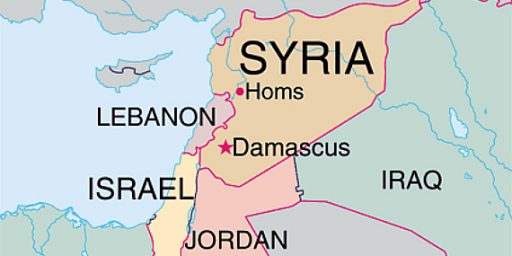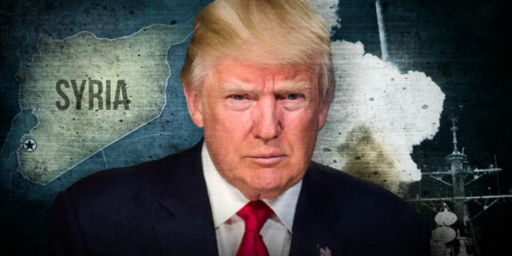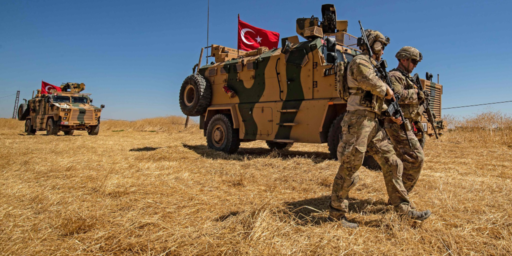Obama Administration Walking Back Obama’s Red Line
Is the White House distancing itself from the President's "red line" remarks about Syria?
The Obama Administration appears to be in the process of walking back the substance of what, since last August, everyone had assumed was the Administration’s “red line” regarding the use of chemical weapons by the Syrian government. The manner in which they are doing it, however, is utterly bizarre and calls into question just how seriously anyone is going to take future foreign policy pronouncements from this Administration:
WASHINGTON — Confronted with evidence that chemical weapons have been used in Syria, President Obama now finds himself in a geopolitical box, his credibility at stake with frustratingly few good options.
The origins of this dilemma can be traced in large part to a weekend last August, when alarming intelligence reports suggested the besieged Syrian government might be preparing to use chemical weapons. After months of keeping a distance from the conflict, Mr. Obama felt he had to become more directly engaged.
In a frenetic series of meetings, the White House devised a 48-hour plan to deter President Bashar al-Assad of Syria by using intermediaries like Russia and Iran to send a message that one official summarized as, “Are you crazy?” But when Mr. Obama emerged to issue the public version of the warning, he went further than many aides realized he would.
Moving or using large quantities of chemical weapons would cross a “red line” and “change my calculus,” the president declared in response to a question at a news conference, to the surprise of some of the advisers who had attended the weekend meetings and wondered where the “red line” came from. With such an evocative phrase, the president had defined his policy in a way some advisers wish they could take back.
“The idea was to put a chill into the Assad regime without actually trapping the president into any predetermined action,” said one senior official, who, like others, discussed the internal debate on the condition of anonymity. But “what the president said in August was unscripted,” another official said. Mr. Obama was thinking of a chemical attack that would cause mass fatalities, not relatively small-scale episodes like those now being investigated, except the “nuance got completely dropped.”
As a result, the president seems to be moving closer to providing lethal assistance to the Syrian rebels, even though he rejected such a policy just months ago. American officials have even discussed with European allies the prospect of airstrikes to take out Syrian air defenses, airplanes and missile delivery systems, if government use of chemical weapons is confirmed.
An Israeli airstrike in Syria on Thursday, apparently targeting advanced missiles bound for the Shiite Lebanese militant group Hezbollah, highlighted the volatile situation. With Syrians already dying by the thousands from conventional weapons, Mr. Obama now confronts the most urgent foreign policy issue of his second term, one in which he must weigh humanitarian impulses against the risk to American lives. After about two years of ineffectual diplomacy, whether or how he chooses to follow through on his warning about chemical weapons could shape his remaining time in office.
The evolution of the “red line” and the nine months that followed underscore the improvisational nature of Mr. Obama’s approach to one of the most vexing crises in the world, all the more striking for a president who relishes precision. Palpably reluctant to become entangled in another war in the Middle East, and well aware that most Americans oppose military action, the president has deliberately not explained what his “red line” actually is or how it would change his calculus.
“I’m not convinced it was thought through,” said Barry Pavel, a former defense policy adviser to Mr. Obama who is now at the Atlantic Council. “I’m worried about the broader damage to U.S. credibility if we make a statement and then come back with lawyerly language to get around it.”
What these anonymous White House officials are saying, essentially, is that Obama committed a gaffe when he said back on August 19tb of last year that ”We have been very clear to the Assad regime but also to other players on the ground that a red line for us is, we start seeing a whole bunch of weapons moving around or being utilized.” Specifically, they’re saying that Obama went beyond the message that the White House intended to send to Syria and established a red line that has now backed the President into a corner. There’s just a few problems with this version of events, though. First of all, there was no attempt by the White House to clarify the President’s statements after they were made. Given the importance of what he said, one would have thought they would have wanted to do that relatively quickly after the press conference in order to ensure that there was no misunderstanding of what U.S. policy was on this vitally important issue. The fact that there was no such clarification suggests that the President had not misspoke back in August as the White House now seems to be trying to suggest. The second problem for this position is the fact that, as Blake Hounshell notes, the substances of the President’s remarks last August have been repeated several times both by Vice-President Biden and the President himself. The only difference has been that, at some point, the phrase “a whole bunch” disappeared from the Administration’s talking points. Whatever the exact words, though, the policy was still basically the same, and the impression was left with the world that the use of chemical weapons by the Assad regime would result in a major change in policy by the United States.
When the President speaks on policy issues, it is generally always important, but it is even more important when he’s speaking on foreign policy issues. When a President makes a statement about tax policy, it is important to the political debate but it isn’t determinitive because Congress must approve any changes in the tax laws. When it comes to foreign policy, though, the President has near complete discretion is setting the direction of policy, so when he speaks it’s important that he speak clearly. Additionally, a Presidential statement carries with it a level of seriousness that requires fairly close precision in delivering the message the Administration wishes to communicate. That’s why there are times were you’ll see someone like the Secretary of State or the Secretary of State making a public statement rather than the President. In this case, though, it seems quite clear that there was a serious lack of precision in communicating what it was that the Administration wished to communicate. The result is that we now find ourselves in a situation where the red line is deemed utterly meaningless, which arguably calls into question the credibility of future foreign policy statements, or we find ourselves getting further involved in a conflict that we’d really rather avoid largely in order to maintain international credibility. That’s never a good reason to go to war.
Last week, I noted this about the President’s “red line”:
President Obama’s problem now, of course, is the fact that he’s painted himself into a corner to some extent. By saying that any use of chemical weapons by the Syrians was a “red line,” he created the impression that the U.S. would not tolerate even a single chemical shell being fired. The “red line” was vague enough, though, that it was unclear exactly what the United States would do if the line was crossed,or even what kind of an act constituted crossing the line. Now that the Syrians have apparently engaged in the limited use of chemical weapons, the world expects the United States to do something and President Obama’s domestic opponents stand ready to pounce if they perceive that he’s backing down from the threat. Unfortunately for the President, backing down may be the smartest thing to do under the circumstances. For that reason, he may come to realize that drawing a “red line” over the use of chemical weapons wasn’t really a good idea after all.
Based on the comments in today’s New York Times, it seems that some in the Obama White House are coming to that very conclusion.







it’s called “waffling”, his own staff are trying to distance themselves from it. must not have made the teleprompter?
“what the president said in August was unscripted,”
Doug wrote:
While the President should ideally wish that he had handled this differently, none of this truly matters. There’s simply not much evidence of regimes that are not already heavily influenced by the U.S. changing their behavior in response to statements by the President. This is why N.Korea has nuclear weapons, Iran will not stop enriching uranium for peaceful purposes and Fidel Castro still leads Cuba.
It’s juvenile to believe that statements from a U.S. President are sufficient to persuade a hostile regime to stop doing something it believes is in its best interest. The sooner this country realizes this the better.
@Spartacus:
The problem is when the President draws a red line, as he did in this case, and then does nothing when the line is crossed
With North Korea, Iran, and this Syria mess, it would be a huge mistake for the president to do anything that could be seen as weak, backing down, or back tracking. One thing has already been done to give some wiggle room: wait until the facts are in. None of this “What I really meant was”
And no apologies !! I do not know how this Assad creep has managed to hang around even this long.
“You can go home pig or pork” Marshall Dillon , “Gunsmoke”
I’d MUCH rather have Obama backtracking on getting involved in Syria than doubling-down on his red-line mistake via a military commitment.
@Doug Mataconis:
I agree with you that it would have been better had he not made those statements. I just don’t think it will have any actual adverse consequences because I don’t think Presidential statements are all that influential to begin with.
Based on your conclusion (which I agree with) that it’s now better to do nothing than to take military action to avoid losing credibility, I think you agree that these Presidential statements aren’t very effective. Otherwise, we really would risk losing this peaceful means of influence if we don’t now back it up with action.
@Spartacus:
When the United States, though it’s President, tells a nation like Syria that “If you do X, there will be consequences.” And then there are no consequences when X happens then that sends a message to others. This is why we should be damn careful about the ultimatums we set
@Gold Star for Robot Boy:
As far as Syria is concerned, I agree. The question is what an episode like this tells us about the future, and about foreign policy messaging in this Administration.
@Doug Mataconis: The President can do nothing and look stupid or get involved in another war in the Mideast and prove it.
The way things are progressing the Israeli Air Force will be our proxy and McCain, et. al. can now scream about Syria and lose Benghazi in the noise.
@Doug Mataconis:
Theoretically, yes. However, there are no real-world examples of countries doing something or refraining from doing something on account of statements a President makes. Hence, my mention of Iran, N.Korea and Cuba, all of which continued to do what they thought was in their best interests despite very stern, serious and even bellicose statements by multiple U.S. Presidents.
The sooner we acknowledge that statements by a U.S. President are essentially useless at influencing countries that aren’t already heavily influenced by us, the sooner we’ll stop sending soldiers to far off lands to kill and be killed for the purpose of maintaining U.S. credibility. As you’ve even often acknowledged, lives have been needlessly lost because we stayed in Afghanistan and Iraq long after there was a mission to be achieved in order to not be seen as cutting and running.
The fact is Americans will not long tolerate a war that has as its only purpose the preservation of U.S. credibility. Everyone outside the U.S. already knows this. Consequently, other countries are not influenced by Presidential statements because they know the U.S. will not endure costly military action in order to back up those statements. We’re fooling ourselves if we think either (a) these statements are influential, or (b) they will lose influence if we fail to back them up.
There’s simply no real-world evidence to support either conclusion.
Everybody who is begging the question of whether or not CW was used by Assad can’t be trusted. The rebs have a record of attempting to fake it, and the evidence on this is still slim. Sanger and crew are not acting like journalists here, they are acting like people who want US intervention in Syria.
These idiots in the White House don’t seem to comprehend that the Presidency isn’t a committee job. The White House policy is what the President says. If he remains quiet then the minions can chatter on but if he makes a statement that is the official US policy, until the President changes it. Or as in this case, is shown to have no willingness to enforce his statements. All over the world, leaders of friend and foe are making their decisions. Japan and Taiwan, even Israel, now know that what Obama says carries no weight when push comes to shove. Iran, North Korea, Syria know that idle threats emanate from the White House and can be ignored.
Of course, ignoring does have some risks. Having demonstrated his weakness, Obama may seek to reclaim some credibility by overreacting. The weak are dangerous as after missing the opportunity to stand, they lash out violently at the wrong moment.
@JKB:
@JKB:
I assume you’ve forgotten that George W. Bush established a red line on North Korean nukes?
Yeah, I thought so.
I’m doing some long-delayed reading on the Korean War, and I am becoming ever more convinced that we need to just stay out of civil wars.
It looks very much as if we made a mistake in Korea — siding with Koreans who had been collaborators with the Japanese during WW2 against genuine Korean patriots allied to the Chinese. It was the South Koreans who were the more brutal in their treatment of civilians, as well as being unmotivated fighters. We may be largely responsible for the North’s evolution into the totalitarian whack-jobs they are today, not to mention having come very close to starting a third world war.
Ditto Vietnam, of course.
Assad is a monster, no one doubts that, but there’s little reason to think the Sunni would be any better. I’ve thought from the start that this is a fight for us to sit out. Assad needs killing, but I don’t think we need to do it.
As for the red line matter, meh. There’s nothing much to be lost by trying to intimidate some thug into being a wee bit less thuggish. Obama has already knocked off Gaddafi, run a relentless drone war against Al Qaeda, and killed Osama. The idea that he’s not believed in this world is utter horsesh!t.
Personally, when it comes to civil wars in this region I support either arming all sides or standing down. BTW, I’m tired of hearing about Obama killed Osama, relentless drone wars with the majority of the casualties being bystanders, knocking off Gaddafi who was a fangless snake, and Arab spring blah-blah-blah. Puppets are only as good as the hand animating the puppet, the praise for endless campaign speeches belongs to the teleprompter. Republicans or Democrats, sides of the same old coin. Flip it at your risk.
@angel with a sword:
Did you actually say something in that word stew?
This just shows that while Obama may be good at running for President, he doesn’t know how to be president.
@angel with a sword: So, killing 191 Americans, numerous men and women from our allied countries, setting up terrorist training camps and supporting said terrorists, holding an ally’s citizens hostage, repeating attacking United States Navy personel, airplanes, and ships makes someone a “fangless snake”?
UN investigation fingers the rebs in testimony.
http://www.reuters.com/article/2013/05/05/us-syria-crisis-un-idUSBRE94409Z20130505
Shy a heck of a lot of details. If true, it may make watching Lindsey and John field the questions kind of fun for a bit.
Sometimes, in poker, you bluff. Sometimes, that bluff gets called. If you bluff with a lousy hand, you don’t keep throwing in chips. You fold and play the next hand.
That said, given that there’s virtually no evidence of chemical weapons use, and what little evidence there is seems to implicate the rebels, I’m not sure what the big deal is here.
@Alex Knapp: And everyone seems to be forgetting that we’ve already had one “false alarm” regarding Syrian chemical weapon usage.
So, now that it’s looking like there’s at least an even-money chance that it’s the _rebels_ and not Assad that using Sarin, do you think the armchair privates upthread will back off of their claims of waffling, cowardice, and incompetence? Will they recognize that the Obama administration might actually have been correct in seeking some real solid confirmation before dropping a brace of Tomahawks or Marines on Syria? Or will they not even notice that they’ve been proved to be saber-rattling warmongers who just want to go shoot someone, regardless of how good or bad an idea that might be?
@legion:
“So, now that it’s looking like there’s at least an even-money chance that it’s the _rebels_ and not Assad that using Sarin”
Good thing we don’t have John McCain in the White House — we’d already be bombing Syria air defenses and becoming embroiled in this one.
@legion:
Umm, let’s answer those in order: No. No. Yes.
Although, with Doug, he is consistent in wanting to avoid military conflicts.
Good, I hope the “red line” goes down the memory hole.
The recent UN report that it was the rebels, not the government, who used chemical weapons is probably helpful here.
As far as Presidential statements and credibility goes, I am not willing to spend one more life and spend one more dollar for the President (or anyone else in this country) on objectives as immaterial as credibility. We need to stay out of any or all civil wars. Have we learned nothing since Vietnam?
@Moosebreath: “Good thing we don’t have John McCain in the White House — we’d already be bombing Syria air defenses and becoming embroiled in this one. ”
Only if we could pull our troops out of Georgia.
@Scott:
I agree. The credibility argument is a catch-all used to support policies that make no sense on their own.
This post is in serious need of update/retraction with regards to developments over which party actually used chemical weapons in Syria.
Israel will jump in and try & drag the U.S into yet another war they would like us to take care of for them! Iran wasn’t getting much traction with President Obama so they felt if they started in on Syria that might get his attention. President Obama hopefully won’t buy into Israel’s never ending desire to be fighting someone! As for the red line, the President is not going to go in there all guns blazing without concrete evidence of who did what to whom and when. We leave that kind of action the Republicans!!
@Caj:
I’m sorry, was it Israel that got us into Iraq? No. So what war, exactly, has Israel gotten us into? I don’t even know of any Israeli effort to get us into Syria, and I don’t really think Israel is terribly enthusiastic about Sunnis taking over the country. They just don’t want weapons leaking out to Hezbollah.
It’s quite possible the main goal of Iraq was to make the ME safe for Israel within the coven of PNAC. I believe they viewed it as a noble cause, as these social “scientists” believed that would be for the best for Arabs as well.
Israel, that is, the Likud, certainly did all the cheer-leading they could. Near the end of this, Bibi mentions that after a few countries, it gets “easier”. A remarkable statement to come from anyone who remembers Germany in the 40’s.
http://www.youtube.com/watch?v=fpQdg4D78Jc
@Moosebreath:
It might not make any difference. The neocon Keymasters and the Right-To-Protect Gatekeepers seem to be looking to hook up here.
@Doug Mataconis:
I’m hopeful that it means fewer pointless overseas adventures in the future.
Would it have better if he hadn’t drawn a red line? Yes.
Is it a good idea to go to war just because of some arbitrary red line? Definitely no.
Is it going to make much difference in how countries react to us? I doubt it.
Seconded.
If I were Obama I’d say “Right now we don’t know who used the weapons. I said if assad used them it would change the calculus. By the way, that’s not synonymous with ‘invade’. Israel’s unexpected strikes also change the calculus. We’re still assessing the situation to figure out what role if any the US should have. God forbid we get into another Middle East war based on faulty intelligence, like the last one, which, you recall, I voted against. “
@Scott: We need to stay out of any or all civil wars. Have we learned nothing since Vietnam?
(cough)Libya(cough)
nicely done!
plus this lead into another story, funny yet true;
Hi, In The Past 2 Years, You Have Allowed Me To Kill 70,000 People
Commentary • Syria • Opinion • ISSUE 49•13 • Mar 25, 2013
By Bashar al-Assad
Facebook10.1K
Twitter2.1K
Google Plus252
Hello. My name is Bashar al-Assad. I am the president of Syria, and in the last two years, you—the citizens of the world and their governments—have allowed me to kill 70,000 people. You read that correctly: I am an individual who has murdered 70,000 human beings since March 2011, and you have watched it happen and done nothing.
I have killed many people: protesters, rebels, innocent civilians. You name a group of people and I’ve killed them. I have killed people with families and loved ones. I have killed mothers and daughters and fathers and sons, and I continue to do so. In fact, I’ve killed many people in broad daylight, but yet here I am, alive and still killing people.
Tell you what, Bill. You go volunteer to fight alongside the rebels. Right behind ya, bud!
@Jenos Idanian #13:
True, that. It’s fairly clear we really haven’t learned much from Vietnam.
Though Syria is, from what I can tell, messier than Libya. Libya was not good policy. Syria would be significantly worse.